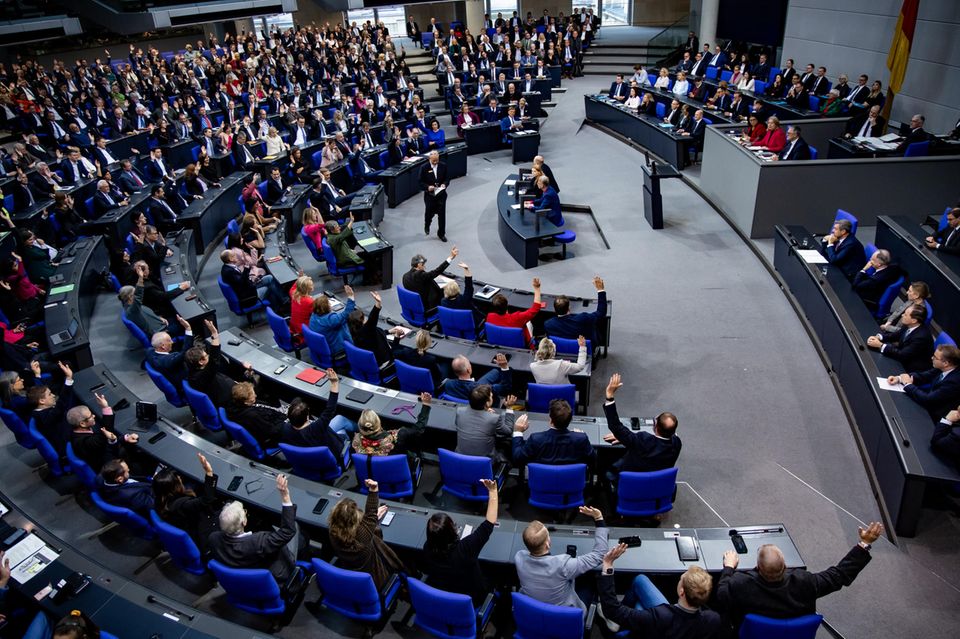Analysis of the economic situation
More money for everyone!
Copy the current link
The economy is limping. The federal government has therefore passed a number of legislative packages. Whether they will still take effect depends on the opposition.
There is hope. Since the red-green minority government agreed with the Union and FDP on a timetable for new elections on February 23rd, parliamentary cooperation seems possible. It would be urgently needed to at least stabilize the stagnating economy. There are a few legislative packages that the federal government has already passed that are suitable for this and that – from a purely programmatic point of view – the opposition could join. One after the other.
Stabilize consumer mood
Private consumption accounts for around half of Germany’s annual economic output. Around two trillion euros. Recently, however, Germans have been saving more again and the mood to buy is rather subdued. In order to stop them from falling any further, anything that doesn’t put additional strain on consumers’ household budgets will help. This includes, for example, the continuation of the Germany ticket for public transport, which is currently used by eleven million people: Although the price will rise from 49 to 58 euros per month from January, the ticket is still significantly cheaper than regional monthly bus tickets and train. The Union now wants to agree to the release of federal funds for this. After a short disturbance from the CSU.
Avoiding the so-called “cold progression” would also be helpful for consumers’ wallets. If the Bundestag did not decide on this, – to put it simply – employee wage increases from January would be eaten up by taxation. In some cases the net income would even be lower. There would be – indirectly – a tax increase. FDP leader Christian Lindner wanted to prevent this “enrichment of the state” as finance minister and signaled the FDP’s parliamentary approval even after the coalition break. The Union has now also joined this. Check it.
Support family income
The federal government has also decided to increase child benefit and the immediate supplement for children. For five euros per month. The amounts may seem small. A small budget calculation shows how much they would help families with low to medium incomes: Additional contributions to health insurance will increase by an average of 0.8 percent from January. For people with low to medium incomes, this means ten to 14 euros less in their checking account. Every month. The planned increase in child benefit and immediate supplement would not put even more strain on the tightest household budgets. At least the social and family politicians from the CDU and CSU should be interested in this. And smart economic politicians too. Exit still open.
Tip for self-help: The additional contributions from health insurance companies already fluctuate considerably, namely between around one and four percent. Changing your cash register can save significant money. A comparison of the new additional contributions is always recommended.
More money for extra work
The federal government’s proposal to make bonuses that employers pay for overtime worked exempt from taxes and social security contributions in the future would bring more net of the gross. Recently, more than four and a half million employees worked overtime. From a purely programmatic point of view, neither the Union nor the FDP should refuse such a project, as they demand “rewarding performance”. It is currently unclear whether the federal government will put the project to a vote in parliament.

This topic also plays in the same field: the birth cohorts with the highest birth rates (1955 to 1964) are currently saying goodbye to the labor market. A quarter of the workforce in Germany is now 55 years of age or older. And according to a current analysis by the job portal Stepstone, more than 70 percent of them are prepared to work beyond retirement. If the federal government has its way, such work should be significantly more worthwhile in the future. This would help retirees and companies willing to work.
Three benefits for companies
Turning to companies: They complain, among other things, about the lack of skilled workers, too much bureaucracy and – like a mantra – taxes that are too high. The federal government had therefore agreed on changed tax depreciation rules and on simplifying and speeding up the process for skilled immigration. The economic politicians from the Union and FDP should be able to agree to both projects. Whether they do so or prefer to use these issues in the election campaign will become clear in the coming weeks. This also applies to another, third initiative of the federal government, the increase in the so-called research allowance. This subsidy would particularly benefit research-based, small and medium-sized companies.
Economy: action or election campaign?
Consumers and companies complain about high energy prices. To mitigate the situation, the federal government has decided on the so-called electricity price package, part of which is already in the parliamentary process: the permanent electricity tax reduction for companies to the EU-permitted minimum. In addition, the government wants to reduce network costs and “stabilize” the fees for them. This would also benefit private households. It is questionable whether the implementation will be politically successful until the new election. The future US President Donald Trump is already attracting companies from all over the world with cheap energy in the USA. But whether the opposition in the Bundestag will allow SPD Chancellor Olaf Scholz and his Green Economics Minister Robert Habeck to be successful in energy policy, of all things, is currently completely open.
The same question mark also applies to the planned reduction in bureaucracy in housing construction. It could definitely help builders, whether private or commercial. The FDP in particular, traditionally well connected in the real estate industry, should not be averse in principle. Will she let SPD Construction Minister Klara Geywitz make the point? At least questionable.
Source: Stern





